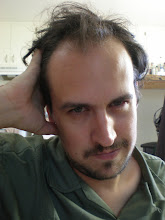Writing: The Prequel
Castle is a fun show anyway. Yes, I said it. Get in there and watch it so it will stay on the air so I can keep watching it. It's brilliant. Imagine Nathan Fillion saying lines such as "He didn't just murder [so and so], he also murdered the English language." Balm to the English Literature major in my soul.
Speaking of writing and writers, November is lurching up from behind the dark side of Halloween, and with it comes the burden/challenge/opportunity/death trap of writing a 50000 word novella with some sort of coherence and meaning.
I won the first year, then fell short by a few thousand (or ten thousand) adjectives, nouns, plot twists, feasible characters with dynamic motivations, etc., etc., each of the last two years. So I'm trying to prepare by doing some writing exercises and reading a book about screenwriting for tips on character development. And so far, no coherent ideas are grasping me by the brain, but I'm hopeful.
Here's the interesting first exercise I tried: the point was to take eight questions from the book and write down the first responses that came to mind.
1) When was your main character happiest?
Drinking in the pubs in a rainy seaside town in Wales with fellow students, or walking along the shore, when everything was simple and sheltered
2) What talent would your main character most like to have?
Ninja skills, or the ability to play beautiful music
3) If your main character could change one thing about him or herself, what would it be?
His nose
4) What does your main character consider to be his or her greatest achievement?
Publishing a poem on the Internet about a parade of Aryan sympathizers
5) What is your main character’s most treasured possession?
Pristine copy of The Beatles’ The White Album
6) What is your main character’s greatest extravagance?
DVD collections
7) When does your main character lie?
When he is thinking thoughts that he thinks should not be popular.
8) What is your main character’s greatest regret?
Failed friendship with someone in rough straits, whom he left behind.
I looked at these answers and thought, "Hmm." Then I turned the page in the book, and it asked, "Did anything surprise you?"
No, nothing really surprised me, except the part about the nose. I don't know where that came from. But all the others, even the ones that aren't true, per se, come from my real life, so that, according to the book, means that I am trying to control the character too much.
My first reaction was What character? I didn't actually have anyone in mind. Maybe that was the problem. Maybe I was supposed to picture someone first. Anyway, I tried it twice more, with mixed results. I'll keep doing stuff like this, and hopefully something will bubble to the surface by November 1st.
I can always write 'the' 50000 times and call it avant-garde, I suppose.
Labels: Castle, Firefly, NaNoWriMo, Nathan Fillion, writing, writing exercise

